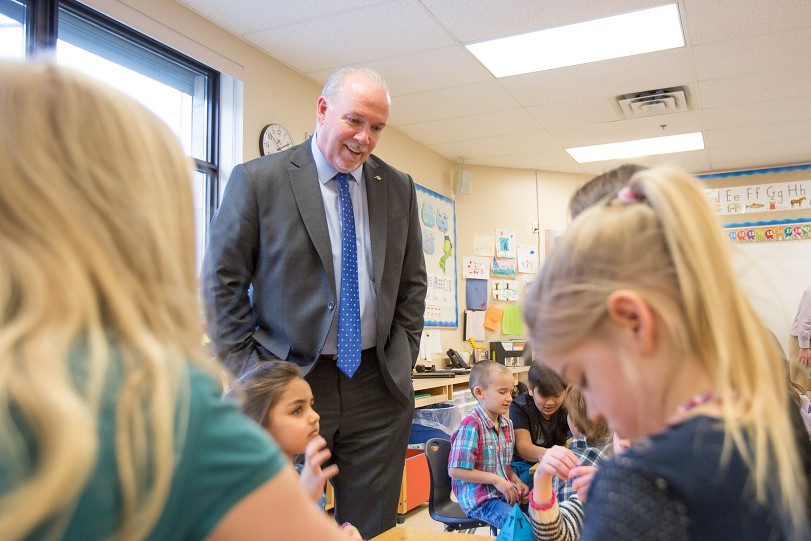We are NDP members and others who care about water, land and Indigenous law, and who are deeply disappointed with the government’s decision to proceed with Site C. While it is painful and difficult to speak out, it’s in times like these when truthfulness and principled honesty are most needed. We will not be silent, and we hope our voices encourage more people to examine why this decision is a terrible mistake.
There are strong ethical, economic and environmental reasons to terminate the dam.
Upon careful analysis, the provincial government’s arguments regarding Site C are not persuasive. This undermines public trust in our government’s commitment to affordability, a robust climate change plan and meaningful reconciliation with Indigenous people.
Since the NDP was willing to cut $4.7 billion in revenue from bridge tolls from the province’s coffers, without any word about accounting regulations or credit ratings, it should seriously examine why it is unwilling to absorb or restructure a smaller “debt” of $3 billion in order to show that it is serious about reconciliation, equity, affordability and climate justice.
The assumption of endless growth based on mega dams to power fracking for LNG is the logic of a cancer. It is unsustainable and it will drive up our carbon emissions (including methane) at the very moment when we need to be reducing them. We need a plan for the future that builds locally resilient communities, strengthens food security and diversifies renewable energies across the entire province.
The BC Utilities Commission (BCUC) Review confirmed that there is no current need for the electricity Site C would produce and that BC Hydro’s forecasts have been consistently inflated for decades. Indeed, Independent Power Producers (IPPs) have been paid millions to not generate energy in B.C. As we decarbonize our society, we can build out incrementally using distributed renewables, including geothermal. Public examination of the dam’s cumulative environmental impacts and accountability processes is urgently needed.
As Canadian Centre for Policy Alternatives economist Marc Lee (and many others) pointed out to the BC Utilities Commission, “Completing Site C will lead to higher debt for BC Hydro and higher rates for all BC Hydro customers. This will increase energy poverty among B.C.’s low-income households.”
We agree with CCPA director Seth Klein that “unconvincing economic justifications — and the fear-mongering of credit rating downgrades — [need to] be challenged, otherwise the precedent is set for more disheartening decisions down the road.”
Moving forward, we call upon the government to:
- Not engage in an expensive and morally questionable legal battle with the two First Nations whose territories are most directly impacted by the dam, and who are seeking an injunction. Not opposing their injunction would be a good first step to show that this government is serious about implementing the UN Declaration on the Rights of Indigenous People.
- Pause new contracts such as the billion-dollar contract going to companies including Aecon, which is being taken over by a Chinese-state-owned company, CCCC. In light of Aecon's takeover, we urge also this government to examine what the effects of investor rights and trade agreements are on the dam and on B.C. ratepayers.
- Consider recent developments in the price of alternative energy, which is decreasing substantially. At the rate that these trends are going, B.C. will spend billions more on Site C only to receive much less in return on investment. That investment could be more effectively directed in ways that generate more jobs and a more equitable social structure, as the NDP’s PowerBC plan shows. PowerBC is a wiser way to move forward to cultivate energy democracy across the entire province. In contrast, Site C may prevent diverse, more nimble, less destructive community-based alternative energies from developing by flooding the market for such energy. First Nations who spoke at the BC Utilities Commission proposed alternatives to Site C that would produce comparable energy while having Indigenous consent. We need a better distributed, community-based economic plan in our journey toward a fossil-fuel free economy.
- Commit to a full-cost accounting analysis of Site C, in accordance with the NDP’s Sustainable BC vision. Using full cost accounting, the high value of the Peace River Valley is recognized as much more than “zero,” once you consider the worth of its carbon sinks (forests), fertile farmland, sacred Indigenous cultural sites and multiple land uses. Even without predictably ballooning costs, the price of the dam is much higher than $11 billion, once we factor in the high reputational costs of not implementing UNDRIP, the loss of biodiversity and much more.
- Retain as much forest intact as possible, given we are in a time of impending climate destabilization and after a summer of terrible fires. They are a natural buffer, complex functional carbon sinks that we cannot afford to lose.
- Declare the Peace River valley a strategic asset needed for provincial food security and use this asset’s value to offset or restructure the debt arising from Liberal mismanagement, which can gradually be repaid back under the BCUC’s schedule.
- Focus on remediation jobs to help us to transition to PowerBC. Better jobs are possible for our union brothers and sisters. As UBC’s Program on Water Governance points out, there are more long-term jobs generated by terminating Site C.
Environmental degradation poses a serious collective threat; it is not a luxury to consider this matter, but the necessary baseline if we are serious about addressing poverty in the long run. Clean water, clean air, reducing our carbon footprint: these are all simply required for our basic quality of life. We as a species need to respect the earth’s natural laws and carrying capacity.
A future worth having is built upon meaningful reconciliation with Indigenous peoples, which leads to reconciliation with the land. In terms of climate action, everyone needs the forests and farmlands intact as much as possible now. Now is not the time to turn our remaining biodiversity into sacrifice zones. B.C. needs the Peace River valley for the greater good of the province.
This statement has been supported by the following signatories, the great majority of whom are NDP members:
Amy Lubik, Port Moody-Coquitlam
Anita Romaniuk, Vancouver-Langara
Andrea Glickman, Vancouver Mount Pleasant
Annie Booth, Prince George
Barbara Mitchell-Pollock, Victoria
Beat Klossner, Kamloops
Beth Carruthers, Gabriola Island
Beth Davies, Duncan, Cowichan Valley
Bernard Hink, Caribou Chilcotin
Betty Baxter, Powell River Sunshine Coast
Bill Woolverton, Nanaimo
Carol Crabtree, Vancouver Hastings
Carol Foort, Heriot Bay
Carolyn Jerome, Chemainus
Charlene Simon, Victoria
Charles Burns, Powell River – Sunshine Coast
Charlie Richmond, Vancouver
Chris Markevich, Campbell River/North Island
Cindy Ross Friedman, Kamloops
Colin Russell, Vancouver
Corky Evans, Kootenay West, Winlaw (former MLA)
David Spragge, Powell River
Debara Wood, Vancouver
Dennis Bannert, Nelson/Creston
Diana Canning, Chetwynd
Diana French
Diane Lake, Vancouver Point Grey
Don Prince, Port Moody
Edith MacHattie, Port Moody
Elizabeth Ennenberg, Powell River
Ellen Woodsworth, Vancouver South
Ewan Quirk, Richmond Steveston
Fae Shaw, Kelowna
Faye Griffith, Cowichan Valley
Gerry Gaydos, Victoria
Gillian Darling Kovanic, Bowen Island
Gillian Jerome, Vancouver/Langara
Gina Gonzalez, Port Moody/Coquitlam
Glenda Woodward, North Island
Harold Steves, Richmond
Heather Kennedy-MacNeill, Courtenay
Heather Royal, Denman Island
Hilarie McMurray, Steveston
Holly Pender-Love, Trail
Jane Kilthei, Cowichan Valley
Janet Fairbanks, Courtenay-Comox
Jeanette Leitch, Coquitlam-Burke Mountain
Jef Keighley, Surrey South NDP Vice-President
Jerry West, Gold River
Jillian Maguire, East Vancouver
Jim Beattie, former MLA Okanagan-Penticton
Jim Cooperman, Shuswap
Joanne Banks, North Island
John Cashore, Coquitlam, former Minister of Environment and Aboriginal Affairs
John Yano, Vancouver Point Grey
Karen Dean, Burnaby North
Kerry Jacox, Nimpo Lake
Lana Maree, East Vancouver
Leah Main, Silverton, Kootenay West
Linda Gray, Quadra Island
Linda Kemp, Quesnel
Lori Goldman, Penticton
Mae Burrows, Burnaby
Maggie Rader, Burnaby North
Marie Purcell, Comox Valley
Mary Susanne Shaw, Kimberley
Maureen Lyons, Winlaw, Kootenay West
Michael Zeitlin, Vancouver
Michelle Quaife, Barriere
Mona Fertig, Salt Spring Island
myna lee johnstone, Saltspring Island/Saanich North and the Islands
Nita Tashoots, Terrace
Norah Bowman, Kelowna
Oosha Ramsoondar, Maple Ridge Pitt Meadows
Pat Moss, Stikine
Patty Tawiyaka, Fraser Lake
Paul Sanborn, Prince George
Raza Mirza, Vancouver
Rick Koechl, Charlie Lake
Rod Marining
Roger Crowther, Cowichan Valley
Saria Andrew, Victoria
Sandra Currie, Vancouver Mount Pleasant
Sandra Harris, Gibsons West Vancouver
Scott Colbourne, Gabriola Island
Sheila McDonnell, Courtenay
Shelley Wright, New Westminster
Silke Sommerfeld, Victoria
Sonya Charlesworth, Quadra Island/North Vancouver Island
Stephanie Smith, Vancouver Mount Pleasant
Steve Gray, Victoria
Susan Westren, Heriot Bay
Susanna Dokkie-McDonald, Crossfield
Terry Martin, Vancouver Point Grey
Tim Walters, Salmon Arm
Tina Filippino, Comox
Tom Perry MD, Vancouver Point Grey (former MLA)
Tracy Speers, New Westminster
Valerie Sherriff, Courtenay-Comox
Wayne Bradley, Courtenay-Comox
Willow Johnson, Vancouver
![]()
Read more: Energy, BC Politics, Environment
















Tyee Commenting Guidelines
Comments that violate guidelines risk being deleted, and violations may result in a temporary or permanent user ban. Maintain the spirit of good conversation to stay in the discussion.
*Please note The Tyee is not a forum for spreading misinformation about COVID-19, denying its existence or minimizing its risk to public health.
Do:
Do not: